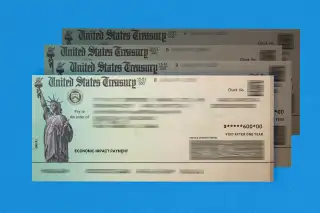228 Million People Were Eligible for Stimulus Checks — but Not Everybody Got One

Over the course of the COVID-19 pandemic, the federal government distributed three rounds of special advance tax credits to eligible Americans as part of its relief efforts. These stimulus checks were widely credited with reducing the economic harm the pandemic could have caused and helping families stay afloat during the crisis.
But how many people actually received stimulus checks?
About 210 million adults received a payment in the first round, according to a new paper published by the Center for Economic Studies (a division of the U.S. Census Bureau). That’s nearly two-thirds of the entire population of the United States. And yet apparently not everyone who was eligible for a stimulus check actually got their money.
Who received stimulus checks, and how quickly?
In total, the researchers found that nearly 228 million people were potentially eligible for a check — that means 92% of people who were eligible for a check actually received one.
The researchers point out that this is relatively high rate of receipt. But still, it means that millions of Americans could have gotten a check did not receive one — despite the IRS's efforts to distribute credits to every eligible person.
The share of eligible people over age 60 who received a payment was especially high at 94%, which the researchers attribute to the federal government’s effort to reach Social Security recipients. There were also differences across racial groups, with white individuals most likely to receive a check if eligible (94%) and Hispanic individuals among the least likely (87%).
The researchers also analyzed how fast people received payments. They found that the first direct deposit payments were sent out within two weeks of the passage of the CARES Act (the legislation that authorized the first round of emergency payments), and the first paper checks were mailed within a month.
That’s very fast by historical standards, according to the paper. During the Great Recession, for instance, the first direct deposit of relief payments was issued within 11 weeks, while the first paper checks were sent within 13 weeks.
More from Money:
IRS Decides State Stimulus Checks Aren't Taxable After All
TurboTax Settlement: 4 Million Reimbursement Checks to Go Out This Month
What's Going on With the Debt Ceiling? 6 Common Questions, Answered